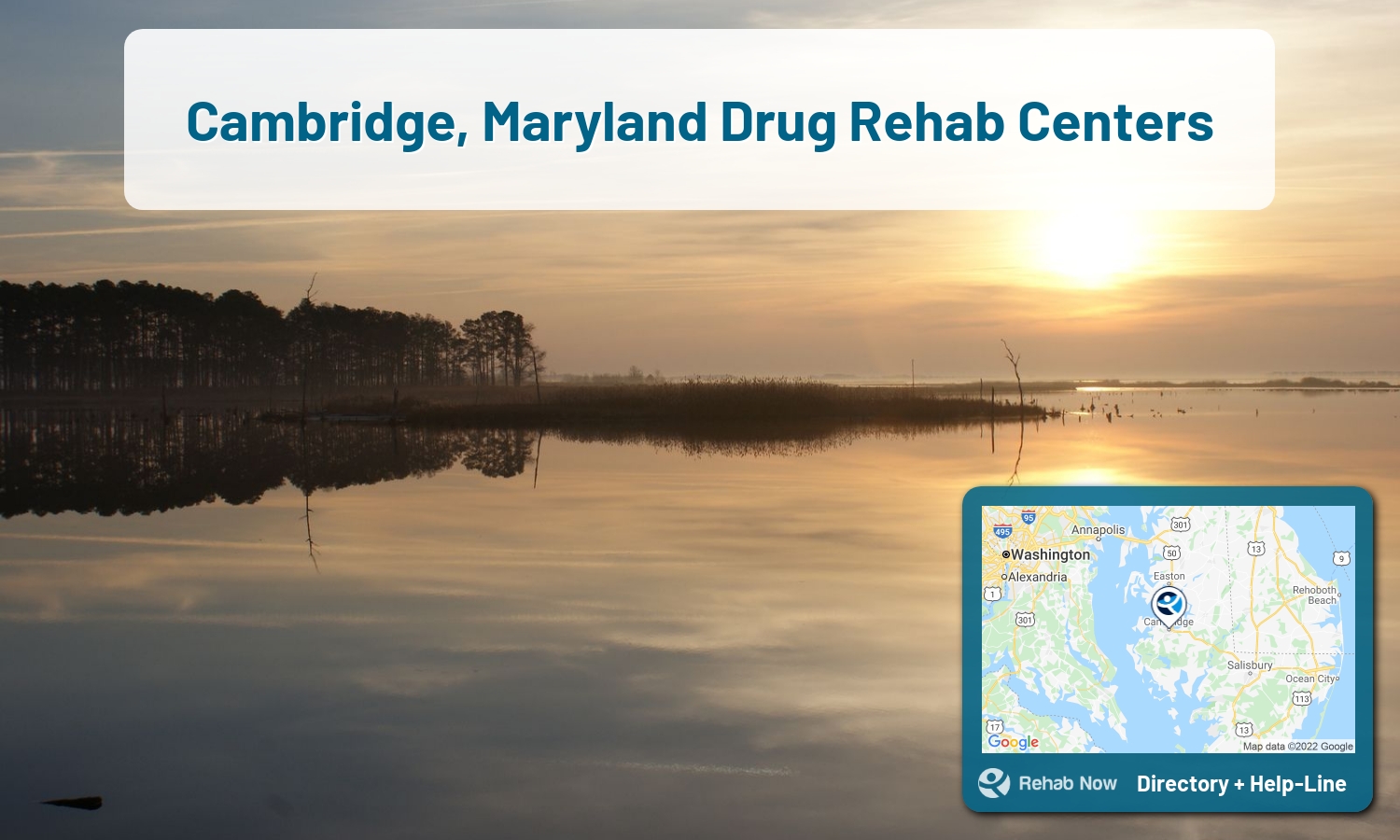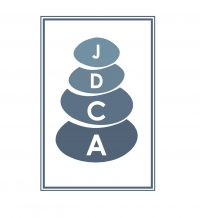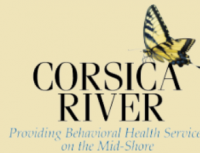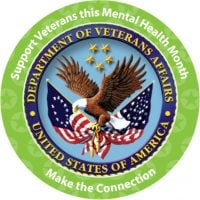Cambridge, Maryland Drug Rehab Centers
According to the National Institute on Drug Abuse (NIDA), rates of both prescription and illicit drug abuse have been on the rise nationwide since the early 2000s, and Cambridge is no exception. Some of the most commonly abused drugs in Cambridge include opioids, heroin, cocaine, and marijuana.
One of the main contributing factors to the increase in drug abuse has been the availability of drugs. With the rise of the internet, drugs are now just a click away for many people. They can be ordered online and shipped directly to your door, making them more accessible than ever before.
Treatment for drug addiction and abuse is available in Cambridge, but it is important to choose a reputable and accredited facility. Don’t hesitate to reach out for help if you or someone you know is struggling with addiction.
Our list includes a range of accessible services in Cambridge, ready to support you or a loved one lead a safe, secure, alcohol-free and opioid-free future. We list many of the best drug treatment facilities and centers in Cambridge, most of them with their own unique qualities.
Don’t do it alone – we’re here to help you with admissions.
We will help you find treatment based on your location, budget, and specific needs and help you get started safely.
Free + Confidential Consultation
Browse 10 Centers in Cambridge, Maryland
For All Seasons - Cambridge Office in Cambridge, Maryland is a reputable drug treatment center accredited by CARF and offering a range of treatment options for individuals suffering from addiction and mental health issues, including aftercare support, dual-diagnosis treatment, outpatient programs, residential programs, and partial hospitalization.


J David Collins and Associates - Cambridge
J David Collins and Associates - Cambridge provides an accredited, personalized drug rehab program with a wide-range of services including detox, intensive outpatient programming, outpatient services, evidence-based therapies such as CBT and DBT, and aftercare support all tailored to the individual needs of clients, with private health insurance accepted.

University of Maryland Shore Medical Center at Dorchester
University of Maryland Shore Medical Center at Dorchester, located in Cambridge, MD, offers comprehensive treatment for individuals suffering from addiction and mental health disorders, specializing in Dual Diagnosis, Mental Health, Alcoholism, Drug Addiction, Substance Abuse, and Opioid Addiction.



Corsica River Mental Health Services - Cambridge provides comprehensive drug rehab services, such as medically supervised detox, psychiatric evaluation, psychotherapy, family therapy, support groups and aftercare planning, as well as holistic therapies such as yoga and meditation to help people find their way towards sobriety and long-term recovery with increased self-confidence and greater ability to cope with potential relapse triggers.
Corsica River Mental Health Services offers evidence-based mental health services to help individuals struggling with substance abuse, including alcohol abuse and opioid addiction, with an integrative approach to therapy and treatment using a range of services from individual and couples therapy to life skills and family therapy.


Adventist Behavioral Health - Cambridge is an accredited 100-bed facility providing comprehensive individualized inpatient care, including evidence-based treatment options and private health insurance acceptance, for those recovering from substance use disorder (SUD).

The Dorchester County Addictions Program provides comprehensive treatment services for individuals recovering from substance abuse, alcoholism, and opioid addiction, using a range of treatment methods and accepting most private insurance plans.
Community Behavioral Health offers expert care for addiction and mental health in the Cambridge, MD area, including customized therapy approaches and accredited, long-term residential treatment programs.

Marshy Hope Family Services is a mental health treatment center that offers various therapies and treatments to individuals and families, with a focus on building resiliency through Cognitive Behavioral Therapy and providing a safe and understanding environment.
Cambridge VA Outpatient Clinic - VA Maryland Health Care System

Information About Substance Abuse and Addiction in Cambridge, MD
Addiction is a disease that can spiral out of control quickly, and it often requires professional help to overcome.
If you’re not sure where to start, drug rehab centers can be a great resource. These facilities offer detox, counseling, and other services to help you get clean and stay sober.

What types of treatment are available in Cambridge, Maryland?
There are many different types of drug treatment options available in Cambridge, Maryland. Some of the most common types of treatment include inpatient treatment, outpatient treatment, and holistic treatment.
Inpatient treatment is a type of treatment where the patient lives at the treatment center for the duration of their treatment. This allows them to receive around-the-clock care and supervision.
Outpatient treatment is a type of treatment where the patient comes to the center for scheduled appointments.
Holistic treatment is a type of treatment that takes a holistic approach to recovery. This means that it addresses the mind, body, and spirit.
Which type of treatment is right for me?
The best type of treatment for you will depend on your unique needs and situation. If you have a severe addiction, you may need to go through detox and then an inpatient treatment program.
If you cannot abandon your responsibilities at home or work, an outpatient program may be a better fit.
You may want to try a holistic treatment program as a complement to traditional treatment methods.
Drug and Alcohol Statistics in Cambridge, Maryland
According to the Maryland Department of Health and Mental Hygiene, around 10% of Cambridge residents reported abusing illicit drugs in the past year. This is slightly higher than the state average of 8%. Opiates were the most commonly reported drugs, with 6% of residents reporting abuse.
In terms of alcohol abuse, around 19% of residents reported drinking excessively in the past year. This is again slightly higher than the state average of 18%. In addition, around 5% of residents reported driving under the influence of alcohol in the past year.
- About 12% of high school students have tried marijuana.
- 18% of drug overdose deaths in Cambridge involve prescription opioids.
- 26% of drug users in Cambridge are between the ages of 18 and 25.
- 35% of HIV and hepatitis C cases in Cambridge are attributed to injection drug use.
Additional Treatment Centers in Maryland
For the past decade, Maryland's rate of drug use and abuse has significantly increased. The overdose rate is currently higher than the national average. This epidemic is due to the many industries where manual labor is required. As soon as prescription opioids were more readily accessible a large part of manual workers started using–and eventually abusing–the painkillers.
Still haven't found the right recovery center? Browse nearby Maryland cities.
- Takoma Park, MD (57.9 mi.)
- Oakland, MD (188.4 mi.)
- Curtis Bay, MD (53.1 mi.)
- Elkton, MD (73.2 mi.)
- Olney, MD (67.2 mi.)
- Snow Hill, MD (45.7 mi.)
- Patuxent River, MD (27.4 mi.)
- Upper Marlboro, MD (40.4 mi.)
- Bel Alton, MD (49.7 mi.)
- Joppa, MD (61.6 mi.)
- Perry Hall, MD (62.2 mi.)
- Glen Burnie, MD (50.9 mi.)
- Baltimore, MD (232)
- Frederick, MD (33)
- Salisbury, MD (29)
- Silver Spring, MD (24)
- Westminster, MD (24)
- Rockville, MD (23)
- Glen Burnie, MD (23)
- Hagerstown, MD (23)
What are the stages of drug addiction?
It is important to understand the stages of addiction in order to identify the warning signs and get help before it is too late.
The first stage of addiction is experimentation. This is when a person first tries a drug, often out of curiosity or peer pressure. At this stage, there is no physical dependence on the drug, and it is easy to stop using it if desired.
The second stage of addiction is regular use. In this stage, a person starts to feel the need to use the drug more frequently in order to experience the desired effects. They may start to neglect their responsibilities and hobbies in favor of using the drug.
The third stage of addiction is dependence. In this stage, the person is physically and psychologically dependent on the drug and will experience withdrawal symptoms if they try to stop using it. This is when addiction becomes a serious problem that requires professional help to overcome.
What are the withdrawal symptoms of quitting drugs?
Withdrawal symptoms can vary depending on the drug being used, but some common ones include anxiety, irritability, fatigue, shaking, sweating, and nausea. In some cases, withdrawal can also cause hallucinations and seizures.
In general, symptoms tend to peak within the first few days after quitting and then gradually improve over time. However, for some people, withdrawal symptoms can last for weeks or even months.
What is detoxification and how does it work?
Detoxification, or detox, is the process of allowing the body to rid itself of a drug. This can be done naturally by reducing the amount of the drug gradually over time, or it can be done more quickly with medical supervision.
Detoxing from drugs is often the first step in treatment, as it helps to prepare the person for the next stage of treatment, which is usually counseling or therapy.
What do best treatment programs consist of?
Most successful programs share certain key components. First and foremost, treatment should be individualized to meet the unique needs of each patient.
In addition, treatment should be evidence-based, meaning that it is based on scientific research and proven to be effective. Treatment should also be comprehensive, addressing both the physical and psychological aspects of addiction. This can include detox, counseling, therapy, and support groups.
Last but not least, treatment should be long-term, as addiction is a chronic disease that requires ongoing management.
Things to consider when choosing a drug rehab center
When choosing a drug rehab center, there are a few things to keep in mind. First, make sure that the center is accredited and licensed by the state in which it is located.
Next, check to see if the center offers evidence-based treatment methods that have been proven to be effective.
Also, make sure that the center has a qualified and experienced staff, as this can make a big difference in the quality of care you receive.
Finally, make sure that the center offers aftercare and follow-up services to help you stay sober after treatment.
How can I prevent relapse?
Relapse is a common occurrence in addiction, but there are things you can do to reduce your risk. First, make sure to attend all of your counseling and therapy appointments. This will help you to stay on track and work through any issues that may trigger a relapse.
Second, stay connected to a support system, such as a 12-step program or a peer support group. These groups can provide invaluable emotional support and accountability.
Third, avoid high-risk situations, such as hanging out with old friends who still use drugs or going to places where drugs are readily available.
Fourth, make sure to take care of yourself physically and emotionally. This means eating a healthy diet, getting regular exercise, and getting enough sleep.
Finally, be patient with yourself. Recovery is a process that takes time, so don’t get discouraged if you have a setback. Just keep moving forward and you will eventually reach your goals.
Those struggling with addiction can find help through addiction rehab facilities in Cambridge, MD. Get help now! (888) 674-0062.









